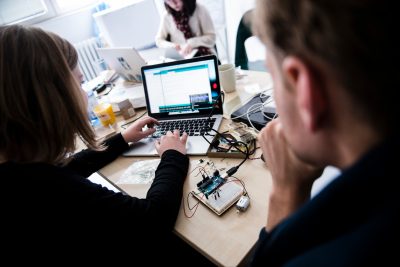Hacker. Almost always, this term evokes the image of a man typing furiously on his computer. In fact, despite having higher levels of education, women represented only 24 percent of the cyber security workforce in 2019, according to a study by the International Information System Security Certification Consortium.

Nevertheless, Boston University alumna Fiona Whittington is determined to change the industry by incorporating better representation not just of women, but for all marginalized genders.
Whittington, a 2019 graduate of the College of Communication, is the executive director and co-founder of TechTogether — a nonprofit started in 2018 to address the lack of gender diversity in hacking by hosting “gender-focused hackathons” across the country, according to its website.
Whittington said the overall mission is to foster an inclusive, safe space for gender-marginalized youth to enter the industry, learn and hack through national gender-focused hackathons. She said the organization also conducts research and other inclusive programming.
“We’re really proud of all the work that we’ve done to increase the representation,” Whittington said. “I’m looking forward to continuing to work towards achieving gender parity within the hackathon space specifically.”
The organization is now the largest hackathon in the country working to address gender inequities in the industry, according to the website — gender diversity increased in hackathons 18% from 2019 to 2020, in part due to the TechTogether’s work.
Whittington said existing gender norms in technology motivated her to start her company.
“Traditionally, we see that societal barriers, like stereotypes, really prevent underrepresented groups,” she said, “specifically people of marginalized genders, from participating in the hackathon community.”
She said her personal reckoning with imposter syndrome at her first hackathon event was also a motivation to start TechTogether. As a non-computer science major and a woman at the event, Whittington said she felt out of place, which was exacerbated when a man asked her if she ever coded.
“Even though I still had an incredible experience, that specific encounter really showed me why creating these safe and inclusive spaces was so important,” Whittington said, “I wasn’t alone in these experiences, which again was what fueled my passion for making these spaces more accessible.”
The organization actually began as an all-female hackathon called SheHacks in 2017, and has since expanded to be more gender-inclusive.
As TechTogether, dropping the pronoun in its name, it was the first gender-focused hackathon to promote gender-inclusive language, according to the website. The organization hopes to advocate for other organizations to make similar changes, Whittington said.
“We wanted to expand upon the work in gender diversity because there wasn’t a reason for us to remain exclusive to serving women specifically,” she said. “There are marginalized voices even within underrepresented communities, and I think to ignore those is doing TechTogether a disservice.”
She said the first hackathon hosted about 700 to 800 hackers and garnered national attention from news outlets, such as The Associated Press and The New York Times. She said the widespread impact confirmed the viability of her venture.
“The impact was so incredible, [we thought] we can’t just leave it here,” she said, “so that’s really where the idea of TechTogether came from.”
Whittington said she decided to continue her project by building a chapter model to expand into cities and rural areas. The organization is now in Boston, New York, Seattle and Atlanta, and plans to expand to Chicago and Miami this year, she said.
Lisa Vu, another co-founder of TechTogether and a 2019 alumna of the College of Arts and Science, first became involved with SheHacks before becoming an organizer at TechTogether — the founding of which was serendipitous, she said.
“My journey with TechTogether was more on the line of being the right person at the right time, meeting the right people at the right time,” she said.
As an undergraduate, Vu said she participated in BostonHacks — an annual 36-hour student hackathon that takes place in November — and said her experience gave her valuable industry knowledge and networking opportunities.
Jennifer Kim, a senior computer science major in CAS and the current director of BostonHacks, said the hacking organization is making effortful steps to maintain a “50-50 gender ratio” and to accept organizers from diverse racial backgrounds.
Kim said she hopes such initiatives foster a more inclusive hacking community.
“Moving forward, I hope more girls get exposure to tech at a younger age,” Kim said, “and it just becomes more of a norm than an anomaly.”
Regarding her college life, Whittington said trying different courses has helped with her entrepreneurship.
“I was a very chaotic BU student in that I took classes in every college,” she said. “But by having that diversity of experience and being able to build such a robust skillset, it really helped me be able to prepare myself to be an entrepreneur.”










































































































